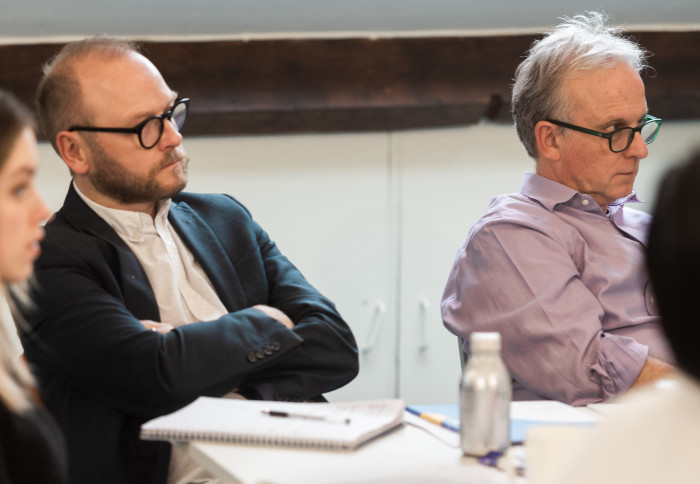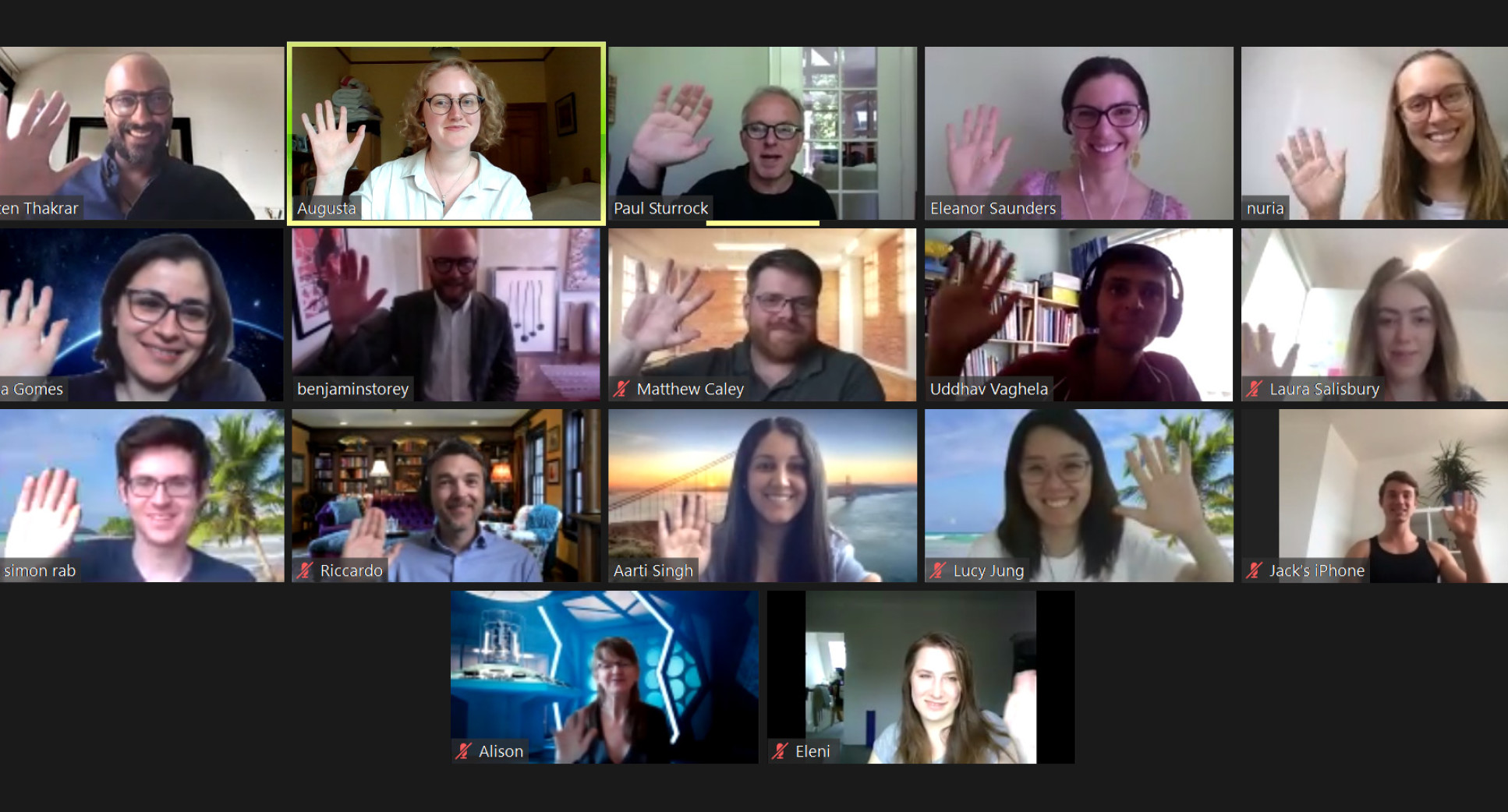MedTech SuperConnector: Collaborating & Networking on Cohort Three

MTSC participant Ben Storey & bootcamp facilitator Paul Sturrock
The Imperial-led medical technology entrepreneurship programme MedTech SuperConnector (MTSC) has graduated its third cohort of entrepreneurs.
It includes teams developing a novel lung therapy trumpet, an innovation in eye testing and a device for managing the symptoms of Parkinson’s.
This cohort kicked off with a three-day entrepreneurial bootcamp last October with 11 participants from across 6 education institutions. It offers participants access to industry networks, domain expertise, medical technology (medtech) workshops, funding and entrepreneurship training.
MTSC, which calls itself ‘an open experiment in medtech acceleration’, supports the development of medical technologies and since its first iteration has adapted and developed its offering to produce an increasingly beneficial, targeted programme in every iteration.

Collaborations for a novel lung therapy trumpet
Ben Storey, from the Royal College of Music (RCM) benefited hugely from the connections made when he was referred on to Imperial’s prototyping community, Advanced Hackspace, by MTSC. He’s working on novel lung trumpet to improve air clearance therapy used in the treatment of chronic respiratory diseases, and while his team designed a non-functional prototype, they needed more expertise to develop past this.
“We needed to create a prototype. That was one of the main goals,” he explained.
“[The Hackspace] were really keen with the idea of what it does and who it helps, and it’s got a good story behind it… the Hackspace have not just been amazing at making the prototype , they’ve given us amazing advice about marketing, creating pitch decks, films and they’ve even designed a website for us as well. They’ve been unbelievable.”
The team is now closer than ever to the final version, and the collaboration has given them connections with other teams within Imperial's entrepreneurship ecosystem, potentially opening up other opportunities.
Dr Terry Clark, Research Fellow and representative for RCM on the consortium has said that facilitating these connections and knowledge-sharing has been a success on this cohort.
“Over the few years we [MTSC] have been learning how to facilitate these interactions and where opportunities might be and what needs to happen to facilitate and broker some of those interactions. Within Ben’s case we’re really seeing that coming to the fore even more than we have within previous cohorts.”
 Alumni communities supporting innovation in eye testing
Alumni communities supporting innovation in eye testing
This hasn’t been lost on Dr Uddhav Vaghela and Dr Simon Rabinowicz, two recently graduated medical students behind VUI Diagnostics. After getting some practical experience in the field, they came up with a more accurate, easier to operate and less expensive device than those currently used to detect retinal diseases.
“The community of the Medtech SuperConnector is absolutely fundamental,” Dr Vaghela explains.
“Other [previous] cohort members have been amazingly helpful, so they’re probably about a year, a year and a half more advanced than us in their progress, but they’ve been so helpful with their time, their connections and everything. Because they’re all medical devices, so they all hit similar hurdles to us.”
Through connections made on MTSC, they’ve found and brought on a commercial advisor in ophthalmic imaging and have been able to reach product development and regulatory goals faster.
“There was a big moment for us in maybe about March where we fully fleshed out everything that we hadn’t done before and that was really with the help of [the Innovation Navigator] and her advice,” said Dr Rabinowicz.
This included ‘honing’ their health economics case, something that all ventures on the programme are encouraged to develop.
Peer-to-peer networking driving a mission and vision
Lucy Jung, a Royal College of Art graduate with a background in patient centred design, is developing a device for managing the symptoms of Parkinson’s and came to MTSC after taking part in the White City Incubator’s Innovators’ Programme.
She explains that for her impact-driven team, it required a shift in mindset. “Our team is really heavily mission- and vision-driven. What we realised through the MTSC and the Innovators’ Programme is that unless we make enough profit our company is not sustainable.”
The cohort ended in June 2020, however the connections they’ve made will continue to benefit to the ventures.
“Because we are still continuously talking on the WhatsApp group, giving each other information and supporting each other I don’t feel like the programme ended…I feel like once you join, the programme may end but that kind of connection you have continues.”
 Connecting the future
Connecting the future
For the consortium, increasing knowledge exchange between institutions and making connections between individuals and organisations is a key part of the programme which developed over time.
Dr Clark explains, “with our first cohort there was so much we just didn’t know yet and [were] trying to get things off the ground and running… whereas now things are off the ground and running so we can be thinking about other things as well.
“There was a lot of learning. I think we’ve taken a different approach now with Cohort Three and those connections are happening a little bit easier.”
MedTech SuperConnector is led by the Enterprise Division at Imperial College London. The Division helps academics and students turn ideas into world-changing technologies, ventures and projects, and works with industry partners to address their challenges with access to Imperial’s expertise, talent and resources.
Article text (excluding photos or graphics) © Imperial College London.
Photos and graphics subject to third party copyright used with permission or © Imperial College London.
Reporter
Eleni Assargiotis
Enterprise